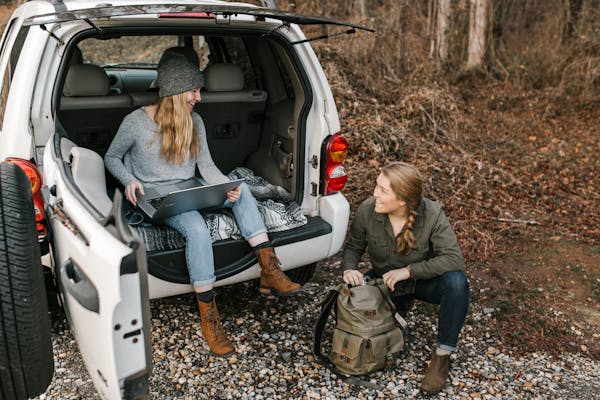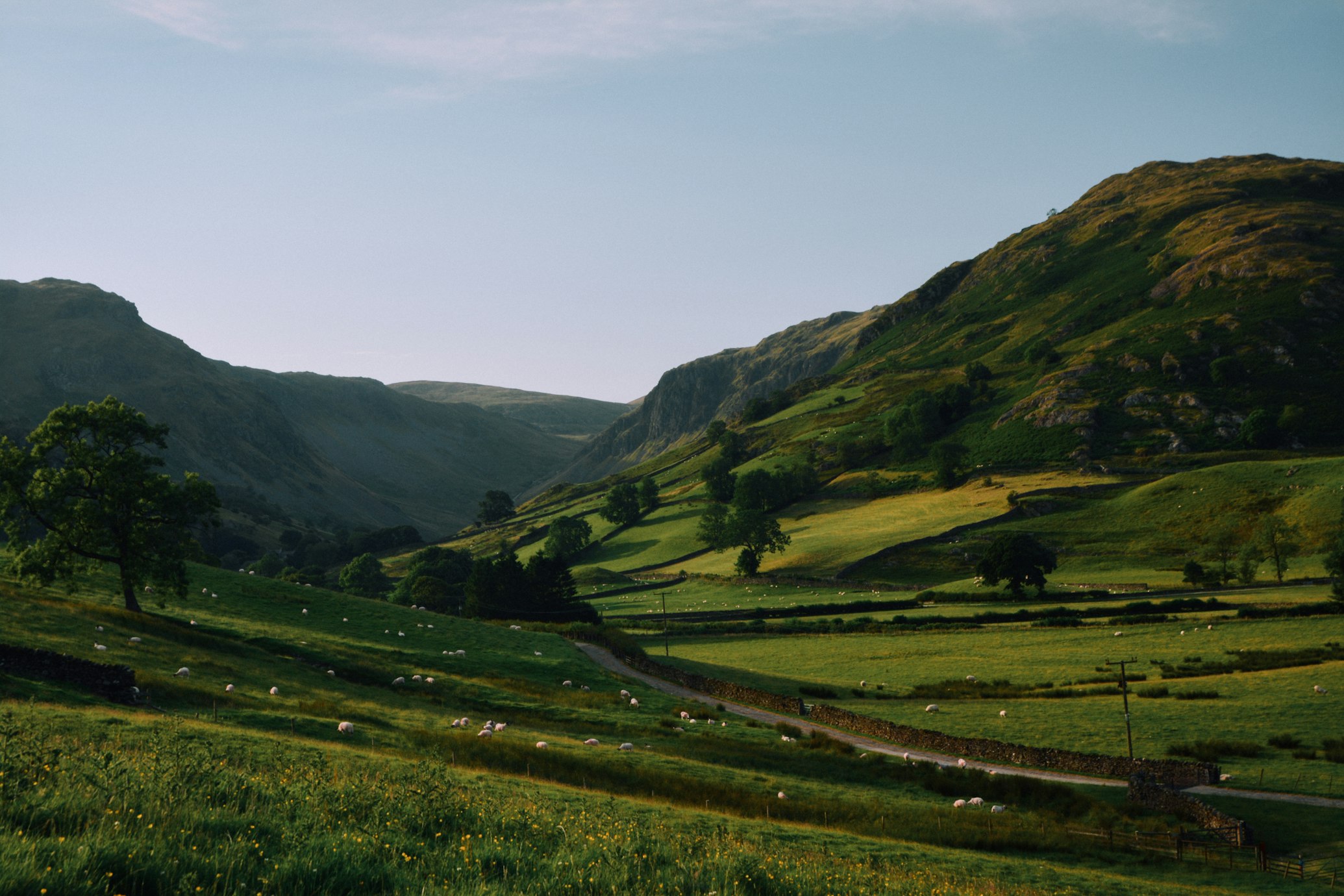Anal backpackers unite!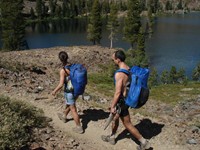
Backpackers have an image of being wild and free, laid back and easy going. Therefore, many people are surprised by how anal backpackers can be. But anal backpackers are not an oddity. On the contrary, sometimes I wonder that compared to the general population, there is a higher percentage of anal folks backpacking. Sadly, I fall into the anal category.
Fortunately for anal people, there are lots of things to fuss over: gear; food; logistics; schedule; camp routines; water purification; and even (gasp!) hygiene.
Normally I'm pretty easy going, but to do a yo-yo you have to reach new levels of analness. I'm not proud of this, but if you want to walk nearly 6,000 miles on the Continental Divide in less than 7 months, then you need the discipline of a drill sergeant.
Let's focus on gear and how you too can become so anal that nobody will ever want to backpack with you.
First, bust out the electronic postal scale that can measure the weight of a penny. After all, put enough pennies in your pockets and you're talking real money.
Second, launch every geek's favorite application: Microsoft Excel (or if you're a true nerd, use an open source spreadsheet).
Armed with these two nerdy tools you're ready to...
Calculate your pack weight
Everyone loves to ask, "How much does your pack weigh?"
Many years ago, heavier was better. After all, if you can haul over 50 kilograms, you must be a real man. Now people are more likely to conclude that you're a real idiot.
Except for a few macho Neanderthals who are still not extinct, most backpackers are trying to minimize pack weight. Today there is an inverse relationship between pack weight and coolness: the lighter your pack, the cooler you are. Therefore, some are taking some extreme measures in an effort to be cooler than Paris Hilton.
Below are some tips to be ultra-cool...
Don't count it
That's right. Just conveniently ignore some items from your list, especially if they're easy to forget. Obviously, you can't leave out your shelter or sleeping bag, because you'll seem like such a freshman. However, few will notice that you left out the weight of a map, an MP3 player, and stow sacks. And absolutely no one will notice that you've left out that deodorant that your partner forced you to bring because everyone knows that backpackers stink.
Use the manufacturer's weight estimates
If Northface tells you your sleeping bag weighs 827 grams, then you can just use their figure, right? After all, why would any gear manufacturer lie about the weight of its products?
To give you an idea of how bad the disparities can be, consider that whenever Backpacker Magazine does a product comparison, they have two columns: one for the claimed weight and one for the actual weight. True anal backpackers will bring their digital scale when they go shopping and smugly proclaim the truth.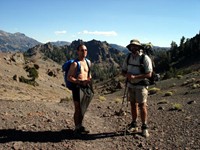
In the defense of the manufacturers, there are good reasons for the disparities between the spec and reality. First, the manufacturing process is not 100% consistent. Sometimes they might accidentally use an extra ounce or two of thread or fabric, for example. Second, some gear makers are so ethical that they underestimate the weight of their products. It's rare, but it happens.
Gear manufacturers can mislead backpacking neophytes. For instance, one friend of mine proudly showed me his "four-pound" tent that sleeps three. He was going off the manufacturer's spec, which ignored the weight of the stow sack, the 12 stakes, and the rain fly. It's an old trick, but the Anal Backpackers of America aren't falling for it anymore!
But for those who want to be cool super-ultra-mega-light-backpackers, just innocently use the weight specs of the manufacturer on your gear list, because you're more likely to come to a lower total weight than reality. Sweet!
Wear it
Another awesome way to underestimate your weight and brag about a sub-2-pound pack is to wear everything. The theory is that whatever you wear does not weigh you down. Why should you count the three-pound camera around your neck if nobody would count the weight of your beer belly?
The cleverest folks will claim that they're wearing most of their clothes while hiking. When making the pack list, don't include your jacket because you'll wear that all the time, even in the middle of summer. If you're brazen, throw the parka into the "clothing worn" category. Shove your pockets full of stuff, like your emergency fire kit, your GPS, and Gossamer Gear's Crotch Pot!
And of course, never count trekking poles, because they supposedly decrease your burden! Nice!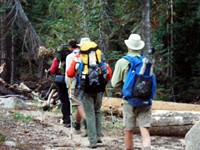
The brilliance of this technique is that few people pay attention to what you're wearing. Instead, everyone wants to know, "How much does your pack weigh?"
When was the last time someone asked you, "How much do the clothes you're wearing (and the stuff that you're carrying in your pockets and hands) weigh?"
OK, enough fun. Let's stop deceiving ourselves!
I run every day and I wear more clothes in the cold mornings than in the afternoons. I've been surprised that it's harder to make good time when I'm wearing heavy clothes. No wonder sprinters and marathoners wear such skimpy outfits!
Therefore, even wearing a 3-ounce wind shirt does create a noteworthy burden and should be taken into account. Moreover, don't account for it on your body if you won't be wearing it most of the time you are walking. Don't deceive yourself.
When people tell me that trekking poles aren't a burden, then I ask them if they are willing to swap them for poles that weigh 10 kilos.
Suddenly, they don't seem so inconsequential. So if 20-pound poles slow you down, then 10-pound poles should slow you down too, half a much, but they still slow you down. Therefore, featherlight trekking poles have an impact, albeit a small one.
It's useful to look at things this way to see if something has an impact. Take anything that you think has no impact and then ask yourself: if that thing's weight increased dramatically would it would have an impact? Then backtrack its weight until you arrive at its actual weight. Usually, you will see that these little things do have an impact. That's the reason anal backpackers clip off one-ounce straps they don't use.
This is useful for other things in life too. For example:
-
A $3 coffee seems like nothing, just like the trekking poles, but if you add enough $3 coffees, after a year you have over $1,000.
-
Some folks argue that smoking one cigarette a week won't do you any harm. But few will argue that smoking 30 cigarettes a day is not bad for you. It adds up.
-
Others argue that raising the minimum wage will not cause more unemployment. So let's raise the minimum wage to $100/hr. Would that force some businesses to lay off workers? Yup. How about a $20 minimum wage? You bet.
By the way, I don't care if you drink coffee, smoke, or want a $20 minimum wage. I'm just using these examples to illustrate a point, which is...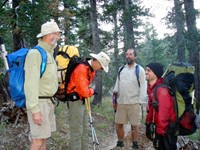
Keep backtracking from the extreme you'll see how little things have little impact. And a lot of little things have a big impact.
This may seem obvious to some, but many people operate believing that little things have NO impact.
If that's the case, then taking one step on a thru-hike would have NO impact on the distance between you and your destination.
But it does. It may take millions of little steps, but doing so magically gets you from Mexico to Canada.
So if you're still awake, let's return to our geeky gear discussion.
Trekking poles may only weigh half a pound, but just like half a pound of clothes has an impact, so does half a pound in poles. Trekking poles manufacturers are the first to brag that carrying poles burns more calories than not carrying them. They're right. The reason you burn more calories is that you're putting greater effort than without them. It's one more thing that you're lugging up the mountain, along with your watch.
Speaking of watches, when Maiu and I were on the PCT, I let her try out my Suunto watch. It's one of those heavy geeky watches that tell time, altitude, direction, and does the dishes.
I immediately noticed a difference on my wrist after she borrowed it. It was crazy! It was noticeably easier to walk! Perhaps it just saved me 10 calories a day, but I could feel the difference. It made me think if that watch weighed a pound, it could slow me down (or force me to carry more food).
I inadvertently did another experiment on the Hat Creek Rim trail. I wanted to measure the temperature difference between the outside of my umbrella and under my umbrella. So I hooked my 2-ounce watch onto the top of the umbrella. Immediately I noticed the difference of carrying an extra two ounces. The umbrella had suddenly become 20% heavier. It made me realize that even though something is not in your pack, its weight should be seriously considered.
What about food and other consumables?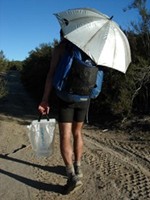
It is funny to see anal backpackers account for every titanium stake they're carrying, but then they will carelessly toss in canned food. Or they'll carry three liters of water in the Olympic National Park (which has pristine water everywhere). Others brag that their alcohol stove weighs one measly ounce, but overlook the half a pound of HEET alcohol that they're carrying. In short, consumables matter.
In the old days, gear used to weigh so much that consumables accounted for less than half of the total (or "skin out") weight. Today, it's quite easy to carry less than 10 pounds of gear, so food and water now account for the majority of the weight you're carrying. Therefore, it's unwise to ignore them.
On the other hand, it's hard to get anywhere if you're starving and thirsty. I discourage hikers to select foods that have a high calorie to weight ratio. If that is your guide, then you'll end up carrying candy bars and butter. Hikers sometimes forget to consider nutrition. If you're going to be anal about food, be anal about getting good nutrition. Aim for nutritionally dense foods.
Same goes for water. Anal backpackers obsess so much about having a light pack that they carry far too little water and end up under hydrating themselves. Err to taking more than you need. Drink more voluminously. Don't skimp.
What about stuff like first aid, soap, fuel, toothpaste, sunscreen, and repellent? Although they are consumables, I put them under pack weight. Anal backpackers will measure the weight of the container and leave out the weight of the contents; they measure the liquid soap bottle, but not the soap. I understand the logic, but I prefer to err on the conservative side, because despite my best efforts, I rarely estimate the amount of these consumables I really need.
When I walk into town for a re-supply, I usually find that I haven't used up all these consumables. With food, I'm more likely to get it right; however, with these types of consumables, it's harder to estimate correctly. As a result, I'd rather overestimate the weight I'm carrying and sacrifice some of the coolness that comes with having outrageously low pack weights.
Why the diatribe?
I'm writing this rant because I love to learn from others and sometimes it's hard to compare gear lists when there is no universal agreement on how to create a gear list. Compare two lists that claim to be under seven pounds, and you may discover that they don't account for items the same way.
I'm not arguing that people should ditch their trekking poles or any other piece of gear. Hike your own hike. Many backpackers couldn't hike at all without trekking poles, so it's wonderful that they exist. I've made some comments about trekking poles because they are an easy target and many people don't fully consider the implications of carrying them.
Also, I'm not so sure that most new hikers have even tried hiking without poles. They go to an outfitter who convinces them that they will be miserable without poles. And that's probably true because most backpackers start off with massive loads that are hard to carry without poles. However, soon they lighten up, but then they forget to ditch the poles along with the other useless gear they tossed. I've known some backpackers who have revisited the idea of hiking pole-less and they're surprised that it's as easy as... walking! I prefer having my hands free, but someday I may use them because I can see their utility.
So how should we count our gear?
If you're a mellow backpacker, do whatever you want. You don't even need a gear list. Just wing it and have fun. Laugh at idiots like me who spend way too much time debating whether one really needs a 2.1-ounce pack cover. Giggle at the morons who spend more time "running the numbers" than running outside. If anyone should feel smug, it's you. You're free from the curse of being obsessed about minute, insignificant details and can concentrate on the big picture of why backpacking is great.
For the tortured souls of Anal Backpackers of America, consider using the following method to create a gear list:
-
Use an accurate electronic scale, if possible.
-
Don't use the manufacturer specs.
-
In the "Clothes Worn" column, list the weight of the outfit that you will be wearing most of the time.
-
List anything that you plan to carry in your pockets (e.g., lip balm, maps, GPS, camera) under the weight of your pack.
-
Total your "dry weight" which is everything except your consumables.
-
Under consumables, list both the average and maximum of what you expect to carry (i.e., fuel, food, toothpaste, soap, and water).
Some recommend listing the maximum weight of your consumables. Although this is useful (and I do it), when someone asks you how much does your pack weigh, I prefer telling them the average weight, not the maximum one. But whatever you do, just note it.
If we all followed such a method, we could more easily compare one gear list to another. We could all learn from trail lore more easily. And we could all become a little more anal.
Oh, wait. Now maybe this is all a bad idea...
Updated 8/8/12
